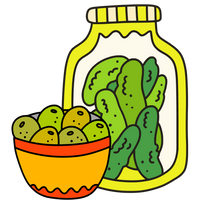
This is an ever growing list of common terms, words and ideas having to do with fermentation, probiotics and microbiome health.

Antibiotics – Antiseptics, sterilizers and medications that eradicate microbial life within an environment.

Bacteria – Bacteria are a type of microbe, there are good bacteria called probiotics that confer health benefits to its host. There are bad bacteria that harm health, examples are E.Coli and Salmonella.
CFUs/ Colony Forming Units – In microbiology, CFU is the unit of measure for reporting bacterial counts.
Fermentation – The metabolic transformation of foods via the actions of microbial organisms.
Fermento – A person that ferments food and is passionate about fermentation and live cultures!
Enzymes – Proteins that facilitate and mediate various chemical functions of digestion.
Flora-A general term to describe the microbial life living within an organism.
GRAS Status- An FDA status for food that stands for Generally Regarded as Safe. Fermented vegetables carry this status, per the FDA.

Gut – The gastral intestinal track where food is digested and microflora live.
Fungi– Living organisms, (not bacteria, not plants and not animals) that can grow in a lacto ferment environment.
Irradiation – A newer food preservation processing method that uses high pressure and pulsed electrical fields to kill microbes in food.
Lacto bacillica/Lacto bacilli/L. Plantarum –These specific species of lactic acid bacteria are commonly found in fermented vegetables. Lacto refers to the genus strain of bacteria that infiltrates the ferment of vegetables.
Lacto Fermentation – The process by which food is preserved by creating a specific environment characterized as saline (with salt) and anaerobic (without oxygen.) This environment is friendly in promoting the growth and creation of microbial life, or abundant probiotics, or good bacteria.
Microbes – Live microscopic bacterial organisms that live and colonize among and within organic matter, both in and on animals and plants.

Microbiome- The colony of bacteria that lives in an organism and works symbiotically with the body to regulate digestion and balance bodily function.
Pickled – A term frequently used interchangeably with ‘fermented’. However, pickling may refer to vinegar and heat-canning methods, both of which kill the live cultures in food.
Probiotics- Live bacteria that when ingested confers a health benefit to its host.
Post Pasteurian – A person or mindset that advocates for fermentation and a scaling back of the mainstream, prevailing antibiotic approach in “food safety.”
Raw – Food that has not been heated above 144 degrees F.
Umami – The Japanese word used to describe the sixth taste (beyond salty, sweet, bitter and sour). Umami us sometimes used to describe the unique flavor of fermented foods and literally translates to ‘pleasant savory taste.’
Yeast – A specific strain of fungi commonly found in fermented foods.








